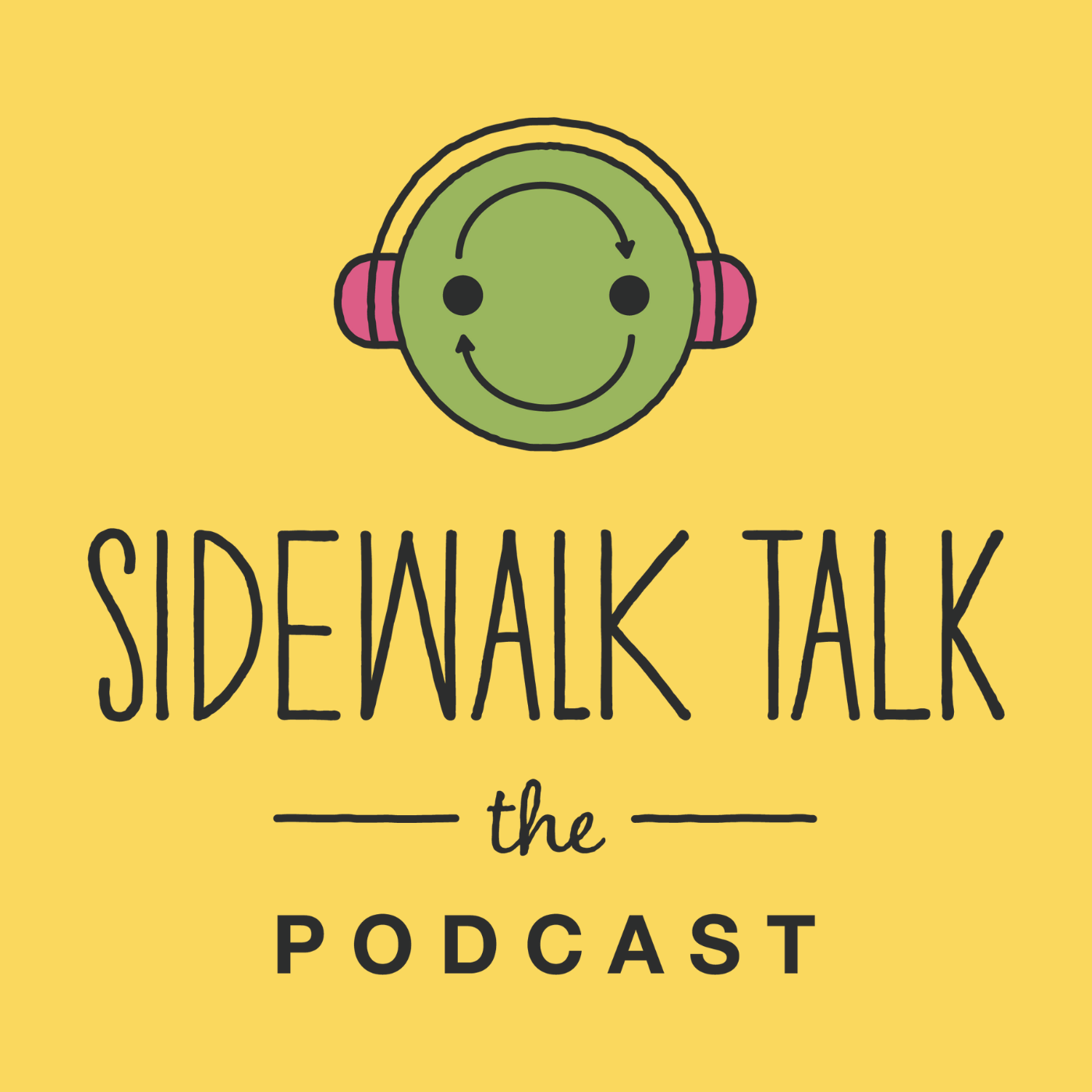
In a world that loves to talk, do, achieve, promote, preach, sell....what does it mean to connect, be, and listen. A podcast about #humanconnection #mentalhealth #socialhealth #empathy #belonging and #loneliness. And always thinking about justice and inclusion in all things. Join us. And share far and wide. Or start your own chapter of Sidewalk Talk in your community. www.sidewalk-talk.org
Episodes
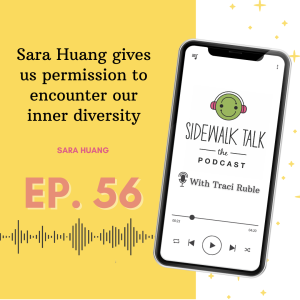
Monday Feb 08, 2021
Sara Huang gives us permission to encounter our inner diversity | Sara Huang
Monday Feb 08, 2021
Monday Feb 08, 2021
At times it might seem like our society is more divided than ever before, and while that might be the case, there are still people out there like Bureau Twist’s Sara Huang whose sole aim is to unite where we are divided and make peace where there is conflict.
On this episode of Sidewalk Talk, Traci chats with her good friend and colleague, Sara, on how exactly she does what she does as a facilitator for teams and an advocate for promoting diversity and deep democracy in the most unlikely places. During their conversation, Traci and Sara hit on everything from what deep democracy means to Sara and how to confront your inner Donald Trump to finding that necessary permission to encounter your own inner diversity and remaining your centered self in the midst of adverse circumstances.
The two wrapped up their time together by discussing how not to become the oppressor in a culture that rewards such behavior, and Sara’s wisdom for you, the Sidewalk Talk listener: tuning into the other person and putting yourself in their place. In a time fraught with division, Sara’s voice is one we all need in our lives today.
Episode Milestones
[00:07] Intro
[01:01] Meet Sara
[08:01] Sara’s take on “deep democracy”
[22:29] Permission to encounter our inner diversity
[30:56] Identities we cling to
[38:10] Not becoming the oppressor
[41:27] How Sara remains in her centered self
[46:21] Sara’s wisdom for you
[49:07] Outro
Resources Mentioned
Standout Quotes from the Episode
“We cannot change what we don’t know. It’s also okay to have compassion for yourself and others when encountered with these blind spots.”
—Sara Huang
“On our path of embracing, such a big part of that is embracing ourselves.”
—Sara Huang
“To have that curiosity, to lean into it, and to show the way without dictating the way.”
—Sara Huang
“Never underestimate the power of naming. Naming it without the urge to fix it.”
—Sara Huang
“I see you. You have a message. I’m not sure what it is exactly, but I’m going to find out.”
—Sara Huang
“Tune into the other. Imagine that you’re there. Listen to the energy in the voice.”
—Sara Huang
Connect:
Find | Sidewalk Talk Podcast
On Instagram: @sidewalktalkorg
On Twitter: @sidewalktalkorg
Find | Traci Ruble
On Instagram: @TraciRubleMFT
On Twitter: @TraciRubleMFT
On Facebook: @TraciRubleMFT
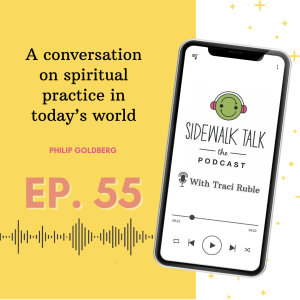
Monday Feb 01, 2021
A conversation on spiritual practice in today’s world | Philip Goldberg
Monday Feb 01, 2021
Monday Feb 01, 2021
When many of us hear the phrase “spiritual practice” we automatically think of monks hiding away from the world, an ashram in India, or spending our whole lives in silent meditation and mindfulness. Renowned author and speaker Philip Goldberg is here to tell us that though spiritual practice can be, and is, all of those things, it’s also a habit we can bring to our crazy everyday lives as parents, students, employees, and people in the 21st century.
On this episode of The Sidewalk Talk podcast, Traci chats with Philip on all things spiritual practice, drawing heavily on his newest, and increasingly relevant, book, Spiritual Practice for Crazy Times. Throughout their conversation the two debunk some of the most common stereotypes many of us have about spiritual practice, go over some of Philip’s favorite and most practical ways to integrate a spiritual practice into your life, and discuss appropriation in spiritual practice and how to best honor the cultures and peoples some of our most common spiritual practices come from.
Spiritual practices are not something far off and unattainable for most of us. Instead, they’re so needed in our increasing crazy world, maybe now more than ever. We hope you find this conversation enlightening and thought-provoking—one that inspires you to start, or continue on, in your own spiritual practice of choice.
Episode Milestones
[00:07] Intro
[01:01] Meet Philip
[03:26] Spiritual Practice for Crazy Times
[05:17] Debunking the stereotypes of spiritual practice
[11:42] Relationship between spiritual life and anger
[16:41] Philip’s practical spiritual practices
[25:00] Bringing intentionality to your spiritual practice
[27:43] Surrendering ego in service as a spiritual practice
[29:48] Appropriation in spiritual practice
[40:24] Philip’s word for you
[43:52] Outro
Resources Mentioned
Spiritual Practice for Crazy Times: Practical tools to cultivate calm, clarity, and courage
The Life of Yogananda: The story of the yogi who became the first modern guru
Standout Quotes from the Episode
“I’m unconventional in that I honor the individuality of everybody’s spiritual perspective and spiritual past and happily draw from anything that works.”
—Philip Goldberg
“Spiritual practices give us a stronger foundation of strength, and inner stability, and calmness of mind so that we can engage in the world without losing our stability, thereby being more effective.”
—Philip Goldberg
“Whether something is spiritual depends as much on what you bring to it as the thing itself.”
—Philip Goldberg
“Are the teachings being transmitted with integrity? Or are they being diluted, and distorted, and corrupted for commercial purposes?”
—Philip Goldberg
“Deep within yourselves, deep within all of us, at our core, our essence, is a sanctuary of peace and a fortress of strength. There are many methods through which we can access that sanctuary on a regular basis and as needed. By doing so we can bring more of the best parts of ourselves, our love, our compassion, our inner peace, our joy, our openness, our empathy to the world and to the other people we connect with.”
—Philip Goldberg
Connect:
Find | Sidewalk Talk Podcast
On Instagram: @sidewalktalkorg
On Twitter: @sidewalktalkorg
Find | Traci Ruble
On Instagram: @TraciRubleMFT
On Twitter: @TraciRubleMFT
On Facebook: @TraciRubleMFT
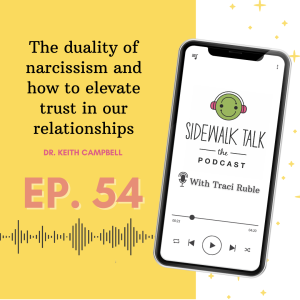
Monday Jan 25, 2021
Monday Jan 25, 2021
Over the last few years, narcissism, specifically narcissism in our leadership, has become top of mind for many Americans. As trust in our institutions has waned, narcissism has skyrocketed. On this episode of The Sidewalk Talk podcast, Traci sits down with Dr. Keith Campbell, a scientist and author who specializes in none other than the study of narcissism and its effects on our relationships and the larger culture around us.
Traci and Keith’s conversation begins with why Keith chose to study narcissism and how this area of thought has evolved over the years since he began his research. In the interim Keith’s written a number of books on the subject, including his newest: The New Science of Narcissism that he hopes will help readers identify the narcissistic tendencies in their own lives.
The podcast wraps up with Keith and Traci’s examination of narcissism in leadership, its rise over the last four years of President Trump’s term, and a look at narcissism in capitalism. Finally, Keith leaves us with a word about daring to take ourselves a little less seriously in the name of genuine connection and building trust. We hope you come away from this conversation with a better understanding of narcissism and its presence in our lives and culture.
Episode Milestones
[00:07] Intro
[00:59] Meet Keith
[03:53] Why Keith chose to study narcissism
[05:26] What’s “new” in narcissism
[09:40] Why we’re all a little narcissistic
[11:24] Keith’s hope for readers of The New Science of Narcissism
[13:28] Narcissism in leadership
[19:01] Cultural/societal inputs that affect narcissism
[23:55] Does capitalism encourage narcissism?
[30:13] How to elevate trust in relationships
[35:47] Keith’s word for you
[38:27] Outro
Resources Mentioned
Standout Quotes from the Episode
“We have these two forms of narcissism out there, and the mistake people are making is that these are the same people, when the truth is, they’re really two different groups of people.”
—Dr. Keith Campbell
“We’ve had lots of very narcissistic presidents. The narcissistic leaders get a lot done, for good or ill. They also get impeached more.”
—Dr. Keith Campbell
“Ego can help you sometimes, but it can do such interpersonal damage.”
—Dr. Keith Campbell
“You can harness your own ego to make the world better.”
—Dr. Keith Campbell
“It’s important, if you want to connect with people, to take yourself a little less seriously.”
—Dr. Keith Campbell
Connect:
Find | Sidewalk Talk Podcast
On Instagram: @sidewalktalkorg
On Twitter: @sidewalktalkorg
Find | Traci Ruble
On Instagram: @TraciRubleMFT
On Twitter: @TraciRubleMFT
On Facebook: @TraciRubleMFT
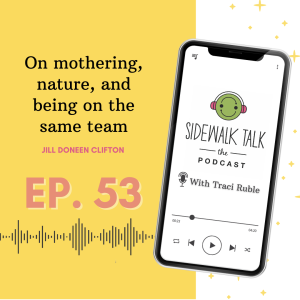
Monday Jan 18, 2021
On mothering, nature, and being on the same team | Jill Doneen Clifton
Monday Jan 18, 2021
Monday Jan 18, 2021
Being a mother is one of the hardest and most sacred callings women will ever experience. It’s an undertaking made all the more difficult by the mixed-messages and unhelpful advice parents the world over seem to be inundated with in today’s culture of “mommy wars,” parenting blogs, and the pressure to raise Instagrammable kids.
Scientist-turned-writer Jill Doneen Clifton wants to take guilt and comparison out of the mothering equation. On this episode of The Sidewalk Talk podcast, Jill and Traci sit down to talk about Jill’s book, Landscape of Mothers and how motherhood and nature are so intricately connected. Throughout their conversation, the two also debunk the myth of good and bad mothers, talk about painful mothering experiences, and discuss being a mother to everyone—whether you’re a mother in the biological sense or not. Jill concludes the interview with an expression of her deep gratitude for you, the Sidewalk Talk volunteers, and all you do to spread love and hope in the world.
Episode Milestones
[00:07] Intro
[00:58] Meet Jill
[03:40] Landscape of Mothers
[05:58] The relationship between nature and mothering
[13:40] Different wisdoms in parenting and the idea of good and bad mothers
[19:06] Painful mothering experiences and how to get on the same team
[28:33] Hopes for mothers reading Landscape of Mothers
[32:00] Being a mother to anyone and everyone
[38:12] Jill’s deep gratitude for you
[42:10] Outro
Resources Mentioned
Standout Quotes from the Episode
“That’s where Landscape of Mothers came from—this sense of needing a map, wanting a way to move and a way to explore the things I just didn’t know, and yet have it be cohesive and coherent and feel like I was actually going somewhere even though I was kind of in the unknown.”
—Jill Doneen Clifton
“For the most part, I don’t really believe in the concept of a good mother or a bad mother.”
—Jill Doneen Clifton
“Landscape of Mothers is really an invitation to bring it back to ourselves and to do it our own way. It’s about finding out where we’re at and what we’re capable of and what we want.”
—Jill Doneen Clifton
“We perceive parenting a child as someone’s individual responsibility, and I think there’s a deep wound in there.”
—Jill Doneen Clifton
“For me, mothering isn’t what women do with children. It’s how all of us care for, nourish, and nurture each other.”
—Jill Doneen Clifton
Connect:
Find | Sidewalk Talk Podcast
On Instagram: @sidewalktalkorg
On Twitter: @sidewalktalkorg
Find | Traci Ruble
On Instagram: @TraciRubleMFT
On Twitter: @TraciRubleMFT
On Facebook: @TraciRubleMFT
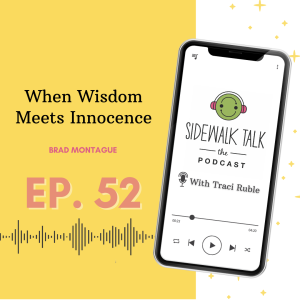
Monday Jan 11, 2021
When Wisdom Meets Innocence | Brad Montague
Monday Jan 11, 2021
Monday Jan 11, 2021
Take a moment to ponder. Do you see as I say there’s sweetness in subtleties and matchless beauty in authenticity?
And if you think you’re nothing, know this- the world needs you to dazzle and all that you’ve got accumulates to incredible magic!
Listen in as Traci interviews Author, Illustrator and Creator Brad Montague, who’s also the man behind the revolutionary web series Kid President- a show that exemplifies the change we can bring to the world by bringing kids and adults to work together. Brad has authored the much-loved book, “Becoming Better Grown-ups'' and is the force behind ‘Socktober’, a worldwide annual drive connecting people to their local homeless shelters. Each year millions of people take part in providing basic human needs to men, women, and children without homes in a community-driven project where people take part for no reward or recognition but only for the good of their neighbors who are homeless. A living example of human wisdom and experience combined with infinite innocence, Brad offers delightful words of positivity that carve a well of joy deep within our insides.
Join them as they discuss life, kids, illustrations and Brad’s beautiful journey in life so far. Also take with yourself a little bundle of joy as Brad gives away gifts of beautiful advice!
Episode Milestones
[02:51] Does Brad talk to his inner kid a lot?
[04:49] Brad reads to us his favorite spots from his book
[11:39] Traci shares the special reason for her fondness to Brad
[15:05] How Brad became the modern day Fred Rogers
[18:46] Brad discusses a memorable experience he had recently
[22:02] On deciding to write kids’ books
[28:11] Brad’s version of empathy and letting people know they matter
[31:06] How do you cultivate the fierceness of heart to be loving?
[36:21] Brad’s little gift of advice for you!
Resources Mentioned
Standout Quotes from the Episode
“I had to learn that in the same way a child expresses themselves, just because they want to, it's like a gift. It's something like an urge.” – Brad Montague [06:29]
“I want to be a heart centered person. I hope that I am.” – Brad Montague [07:25]
“I feel less alone. I also think listening on the sidewalk has helped me move out of fixing people. And really recognizing that, gosh, if I just see people all the way and remove all the limitations in me that might prevent me from seeing them, that in and of itself is the magic. ” – Traci [08:46]
“I have always been fascinated by the strength that it takes to be tender, the boldness in being gentle.” – Brad Montague [16:06]
“If we nurture that, if we notice that, if we really celebrate those little bitty things that are happening every day that are holding society together, it will grow. ”– Brad Montague [25:18]
Connect:
Find | Sidewalk Talk Podcast
On Instagram: @sidewalktalkorg
On Twitter: @sidewalktalkorg
Find | Traci Ruble
On Instagram: @TraciRubleMFT
On Twitter: @TraciRubleMFT
On Facebook: @TraciRubleMFT
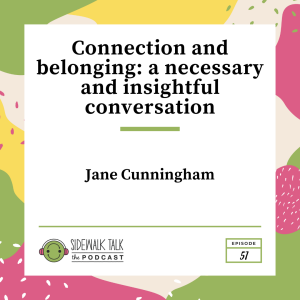
Monday Dec 28, 2020
Monday Dec 28, 2020
Connection and belonging are two very human things that are continuing to slip away in our modern Western culture of increased screen time and decreased face-to-face interaction. Self-proclaimed “soul worker” Jane Cunningham is doing her part to reverse that trend.
In this episode of Sidewalk Talk, Traci sits down with Cunningham for a conversation on human connection, our mutual desire for belonging, and how we can strive for both even in the midst of a global pandemic. With their shared interest in polyvagal theory and Maori culture, the two women invite listeners into a conversation that will deepen our understanding of self and open doors to discovering who we truly are.
Episode Milestones
[00:09] Intro
[01:01] Meet Jane Cunningham
[06:12] Jane’s take on polyvagal theory
[10:30] The tension between our individual freedom and our community well-being when it comes to COVID-19
[12:24] The notion of belonging as something we’re creating
[16:28] How our self is shaped by the over-culture of where we’re from
[18:58] The acknowledgement of soul as part of the human experience
[20:46] Jane’s connection to Maori culture and reconnecting others to the divine
[27:10] Discovering where you come from as a means to discover self
[33:00] The struggle to win belonging through perfection
[35:24] Reshaping storytelling in our culture
[41:12] Getting better at feeling, not just feeling better
[43:13] Jane’s word for you
[47:51] Outro
Resources Mentioned
Standout Quotes from the Episode
“Belonging is a crucial part of what makes us feel safe. And when we feel safe, we’re more able to think clearly and use this developed part of our brain in service of not only ourselves, but each other.”
—Jane Cunningham
“If we only think about what serves me and I don’t care about you over there, then we don’t have that belonging, which is that crucial part of functioning from that more recent, more developed part of our brain. We’ve got to think about community.”
—Jane Cunningham
“Our souls have a longing to remember our connection. I think the longing and remembering are what we are hungering for.”
—Jane Cunningham
“There’s something about modern Western culture that kind of chips away at all of us. Not to the same extent, but we’re asked to not be human. We’re supposed to be perfect.”
—Jane Cunningham
“What you’re doing out there on the sidewalk—whether you’re the listener of the storyteller—what you’re doing is healing our cultural wounds. You’re doing sacred work.”
—Jane Cunningham
Connect:
Find | Sidewalk Talk Podcast
On Instagram: @sidewalktalkorg
On Twitter: @sidewalktalkorg
Find | Traci Ruble
On Instagram: @TraciRubleMFT
On Twitter: @TraciRubleMFT
On Facebook: @TraciRubleMFT
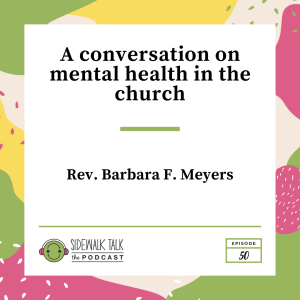
Monday Dec 21, 2020
A conversation on mental health in the church | Rev. Barbara F. Meyers
Monday Dec 21, 2020
Monday Dec 21, 2020
Mental health isn’t a subject that’s addressed among church congregations all that often. But if it was up to Reverend Barbara F. Meyers, that silence wouldn’t be the norm. A Sidewalk Talk volunteer and author of the book Held: Showing up for Each Other’s Mental Health, Rev. Meyers’ goal with everyone she meets—from the sidewalk to the sanctuary—is to make the world a little friendlier place.
Listen to today’s episode as Traci talks with Meyers, her longtime friend, about Meyers’ own mental health struggles, putting Held out into the world, and her biggest wish for everyone listening. Especially if you work in or are involved with a church, this is an important conversation you won’t want to miss!
Episode Milestones
[00:09] Intro
[00:57] Meet Rev. Barbara F. Meyers
[03:48] Barbara’s mental health story
[13:15] Intro to Held book
[15:15] Barbara’s Sidewalk Talk stories
[20:32] Differences between church, clinic, and sidewalk when it comes to mental health conversations
[26:32] Barbara starting her own Sidewalk Talk groups in Freemont, CA
[29:12] How to listen, but not take in, everyone’s personal angst
[32:38] Barbara’s wish for you
[33:41] Outro
Resources Mentioned
- Held: Showing up for Each Other’s Mental Health
- Mission Peak Unitarian Universalist Congregation
- Life Reaching Across to Life Peer Support Center
Standout Quotes from the Episode
“My fondest wish is that people would read [Held] in their congregations and find ways of helping other folks to follow some of the lessons, or not do some of the things that I say are harmful.”
—Barbara Meyers
“When we first started sitting out on the sidewalk, I think people were really wary of us! They probably thought, ‘what are these two white, elderly ladies doing here?’”
—Barbara Meyers
“I’m just there for a couple hours a week, but you think of the people that are there every day out on the sidewalk—sometimes out there all night long, too—and wow, what they have to deal with in their life is just unfathomable. If there’s any way I can make the world a little friendlier for someone like that, I will.”
—Barbara Meyers
“I wish you would find something in your life that you were meant to do on this earth. Because once you find that and you know that’s who you are and why you’re here, nothing’s going to stop you from making it happen.”
—Barbara Meyers
Connect:
Find | Sidewalk Talk Podcast
On Instagram: @sidewalktalkorg
On Twitter: @sidewalktalkorg
Find | Traci Ruble
On Instagram: @TraciRubleMFT
On Twitter: @TraciRubleMFT
On Facebook: @TraciRubleMFT
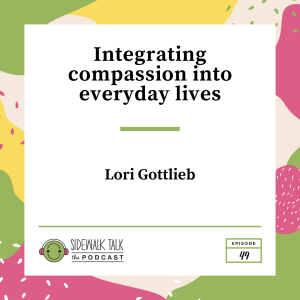
Wednesday Dec 16, 2020
Integrating compassion into everyday lives | Lori Gottlieb
Wednesday Dec 16, 2020
Wednesday Dec 16, 2020
Who is the person you talk to the most everyday? Do you treat that individual with the love and compassion that they deserve? Your responses might change if you realize for the better that that special individual is no-one but you!
Today, Lori Gottlieb joins us to talk, connect and make understand the infiltrating power of therapy and tells us why she abstains from giving any less than her complete mind into understanding a patient’s pain and state. She is a psychotherapist, podcaster, New York Times bestselling author, nationally recognized journalist and also the weekly “Dear Therapist” columnist for The Atlantic. Lori was a journalist before she stepped into the role of a therapist and has authored the book “Maybe You Should Talk to Someone”, which is being adapted as a television series. She has effortlessly voiced the inspiring role of a therapist in a seeker’s life, making known that by not being interventive and by achieving the right balance between intentions and strategy, one can help magically transform a person’s life for good.
Listen in as Lori offers her beautiful take on therapy by speaking as a seeker and also a clinician, while also shifting our focus into understanding people through a wider lens of reference. She also shares her thoughts on making her personal life known to people through her book, and how it has helped more therapists and patients alike connect with her on a personal level. We also discuss virtual therapy sessions and understand how the unprecedented times of today have brought us resilience, flexibility, creativity and adaptability, helping inspire and create hope for a better tomorrow.
Join us on this episode and understand the healing power of listening and connecting, for Lori’s are unmatchable words of wisdom!
Episode Milestones
[00:09] Intro
[00:58] Meet Lori Gottlieb
[03:05] Understanding Lori’s life journey
[08:55] How Lori views her hopes on her book
[12:19] Lori discusses her experience seeing a therapist
[14:11] Why therapists need not be interventive
[15:25] How Lori feels about sharing her personal life through her book
[24:05] Understanding therapy
[25:16] Virtual therapy sessions
[34:10] Differences between listening skillfully and listening as a therapist
[36:56] Lori’s words of wisdom for the listeners
[39:55] Outro
Resources Mentioned
Standout Quotes from the Episode
“The more educated that people are about the process, the more interested they might become in terms of seeing what I can do for them.” – Lori Gottlieb [03:26]
“Sometimes, the lens through which we view our lives or situations can be very narrow and we don’t consider what another version of that story might look like.” - Lori Gottlieb [8:22]
“I think there’s that balance of being really strategic and intentional about what you’re doing in the room but you’re doing it with the context of who you actually are.” - Lori Gottlieb [14:22]
“I always find doing therapy really inspiring.” – Lori Gottlieb [31:14]
Connect:
Find | Sidewalk Talk Podcast
On Instagram: @sidewalktalkorg
On Twitter: @sidewalktalkorg
Find | Traci Ruble
On Instagram: @TraciRubleMFT
On Twitter: @TraciRubleMFT
On Facebook: @TraciRubleMFT
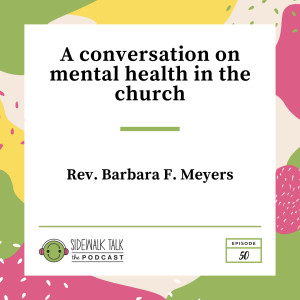
Monday Dec 07, 2020
Incredible Ways To Spread Empathy with Daily Haloha | Amy Giddon
Monday Dec 07, 2020
Monday Dec 07, 2020
Imagine a space where you could anonymously, without judgment or a sense of popularity, could connect with, refresh and uplift yourself and fellow others in a more humane way. You could be your unique self and still never feel alone, for you knew we all mattered alike.
That is what Amy Giddon had started with. Amy is the CEO and Co-founder of Daily Haloha, a mobile app and technology platform for people to connect more deeply and compassionately to themselves and to others through a shared experience of reflection and curiosity around a single daily question. Amy left her business and organizational background to listen to her true calling, and now finds herself in better alignment than she had ever before.
Listen in as Amy joins Traci on this week’s podcast to discuss self-growth and connective consciousness while sharing with us her inspirational journey as a listener with Sidewalk talk and as an entrepreneur chasing her life goals!
Self-reflective and connected conversations could do magic for you, by introducing you to an exuberant and positive world of empathy. Join us on this episode to see for yourself the magic that Amy reflects with her venture!
Episode Milestones
[00:09] Intro
[00:58] Meet Amy Giddon
[04:02] Understanding Amy’s life journey
[06:20] Amy talks of the Subway Therapy sticky note project at NYC
[09:47] Amy shares how she came up with the idea of “Daily Haloha”
[16:21] The foundational principles of Amy’s app
[17:06] Amy discusses the vulnerability and risks associated with her project
[21:54] Understanding the app and knowing the team behind it
[26:43] The inspiration behind Daily Haloha
[30:36] Talking “Collective Effervescence”
[33:50] Something special coming up for the listeners!
[34:38] Amy’s experience as a listener with Sidewalk-talk
[46:26] Amy’s words of wisdom for you
[48:38] Outro
Resources Mentioned
Standout Quotes from the Episode
“I felt so disturbed by not just the outcome of the election but also the process of the election and how that brought us into extreme division, not only socially and politically, but around our dinner tables.” – Amy Giddon [05:30]
“The only way to see it come to life was do it.” – Amy Giddon [13:48]
“It’s been an exhilarating and terrifying ride and sometimes, all in the same day.” – Amy Giddon [17:10]
“I’m understanding myself in whole new ways, I think because I’m learning a lot of things.” – Amy Giddon [26:12]
“In Sidewalk listening, it’s not like you’re not supposed to listen, but you’re not supposed to insert yourself on the story and it is such a different kind of practice.”– Amy Giddon [37:58]
Connect:
Find | Sidewalk Talk Podcast
On Instagram: @sidewalktalkorg
On Twitter: @sidewalktalkorg
Find | Traci Ruble
On Instagram: @TraciRubleMFT
On Twitter: @TraciRubleMFT
On Facebook: @TraciRubleMFT
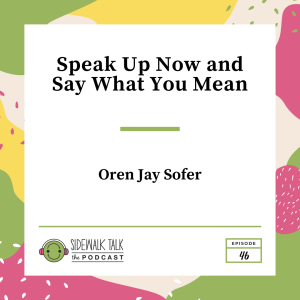
Thursday Nov 19, 2020
Speak Up Now and Say What You Mean | Oren Jay Sofer
Thursday Nov 19, 2020
Thursday Nov 19, 2020
Have you ever thought about walking a balance beam, or a gyroscope, or a tightrope walker? One is continually thrown off balance, but is every time instantly hit with the need to readjust and maintain poise. Equanimity is just that- the practice of balancing one’s mind to contain and open up to pain and discomfort while tuning it to revert to calmness.
In a moving episode today, Traci is joined by Oren Jay Sofer, founder and Guiding Teacher of Next Step Dharma, an innovative online course focused on bringing the tools of meditation to daily life, and co-founder of Mindful Healthcare. He is also the author of the book “Say What You Mean: A Mindful Approach to Nonviolent Communication”, and has created mindfulness programs for a number of organizations, companies, and apps.
Growing up with a mentally ill-family member, Oren was faced with the obligation to stay pretentious of his feelings and needs. And when things started falling apart in multiple ways, Oren turned to meditation and spirituality. Listen in as Oren expounds on his directional journey learning from his Buddhist teachers in India, understanding pain, empathy, humanity and non-violent communication, and housing the deep well of pain inside ourselves while generating equanimity to stay from decentering our thoughts. Oren has also shared how important it is to be willing to hold discomfort- for if we are seeking to transform the society, then no part of our action should come out of control and reactivity.
Understanding society for its diversity and disproportion, and sitting down to listen to each other could phenomenally transform our relationships with people. We hope the power of Oren’s words reflect in each of your lives, and modulate all your thinking for the better!
Episode Timeline:
- [00:09] Intro
- [00:58] Meet Oren Jay Sofer
- [03:32] Understanding Oren’s early life
- [08:11] How Oren was introduced to Dr. Marshall Rosenberg’s works
- [16:20] How Oren sees the injustice happening around American culture today
- [12:34] Maintaining balance between the relationship and her business
- [21:04] Understanding the need to house discomfort
- [23:46] Understanding equanimity
- [27:19] Training ourselves to see beyond the surface perceptions and judgments
- [31:43] How to view differences and diversity
- [36:25] Oren’s advice for you
- [38:07] Outro
Resources Mentioned:
Standout Quotes:
- “It's an awareness practice that helps us to transform the way we understand and relate to ourselves, other people and the world, through the lens of language and thought, and in many ways, it helps us to unlearn a lot of the socialization process that I was referring to earlier.” – Oren Jay Sofer [08:24]
- “My practice is finding enough nourishment in life through anything and everything, moments with my partner, my own meditation, practice gratitude to my teachers, the beauty and nature.” - Oren Jay Sofer [18:06]
- “If we can't be with our own discomfort, then there is a part of our action in our response that is coming out of reactivity and control.” - Oren Jay Sofer [21:52]
- “And part of being deeply in touch with life means opening to discomfort and pain because that's what it is to be human.” – Oren Jay Sofer [24:48]
Connect:
Find | Sidewalk Talk Podcast
On Instagram: @sidewalktalkorg
On Twitter: @sidewalktalkorg
Find | Traci Ruble
On Instagram: @TraciRubleMFT
On Twitter: @TraciRubleMFT
On Facebook: @TraciRubleMFT
Find | Oren Jay Sofer
On Instagram: @orenjaysofer
On Facebook: @OrenJaySofer
On Twitter: @orenjaysofer
On YouTube: @Oren Jay Sofer
